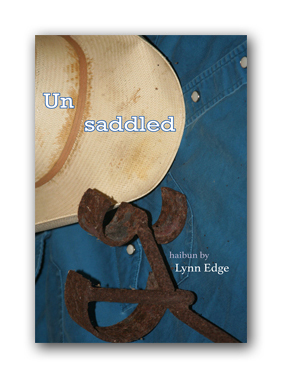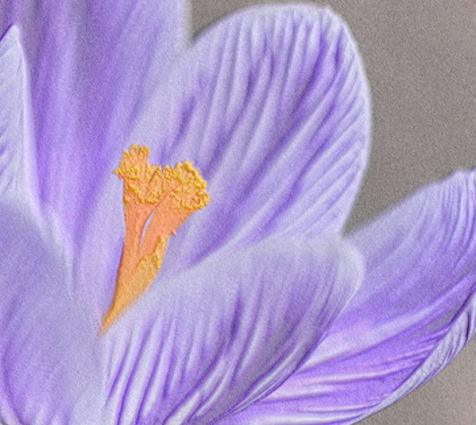
Book Review: Unsaddled
By Lynn Edge
Published by Red Moon Press
2022, paperback , 108 pages
ISBN: 978-1-947271-96-8
$20.00 US
Ordering Information
Reviewed by Glenn G. Coats

Lynn Edge grew up in Texas and has lived for fifty-six years in Tivoli, an unincorporated community in the southeast part of the state. I have lived in four states and in eight different towns in New Jersey alone. My sense of home has changed through the years, while Lynn’s is grounded in one place.. That is what I both envy and admire in her new book, Unsaddled. Reading through this volume is like looking through a scrapbook of one small Texas town, capturing moments of Lynn’s life with grace and dignity.
Those moments do not burst with angst but flow elegantly and leisurely. While the poems (34 haibun plus several haiku and sequences) aren’t divided into chapters, they are arranged so that some appear in themed groups—friends, weather, family, dogs, the aftermath of Hurricane Harvey. The first five poems are about friendship. In “Once We Were Cowgirls,” I feel the cold and taste the dust as two friends ride their horses across wide open land, then move to the warmth of a cozy apartment, where the two friends bask in the aroma of a baking roast. The capping haiku tells me that the memory is from a long time ago, and that perhaps a lifetime has passed since that memorable day.
frayed edges on my recipe card winter rain
This is followed by a haibun that describes how a friend—presumably the same one with whom she shared that roast—ultimately became a trucker, before heart surgery ended her days on the road. The friend takes on a name in the next haibun, which describes her vividly.
Gail
Black hair. Curves in tight jeans. She was the bold one. I admired her adventurous life; she wanted what I had. Two weeks before her death, she said, “Remember that blue taffeta dress? I wanted clothes like yours,” and I replied, “But you got all the dates.”
four divorces
a chest drawer filled
with negligees
Reading its first few lines, I quickly imagine girls that I grew up with who kept me and my reticent ways at a distance. But the haiku is a reminder of how we see things from different perspectives as time passes, and that our lives are the accumulation of many memories.
Just as she’s good at capturing lives, so does Lynn make her native region come alive. In the preface to his collection of selected haiku, The Silence Between Us, Wally Swist writes, “It is in looking and looking, then seeing, that we experience what is epiphanal in the commonplace.”
This book is filled with details that allow readers to see the “commonplace” in Texas and experience its epiphanies. In the haibun “Making Do,” Lynn uses just two sentences to convey the harsh realities of living on a farm or ranch.
He keeps the pistol hidden on a high shelf because we have small children in the house. When I hear it being taken down, I know some sick or injured animal will die.
hog skinning
he stitches the gash
in his arm
Another haibun, “Wind,” captures why horses hate the wind—how it can tickle their ears and turn a piece of paper into a floating spook. Although the closest I ever came to riding a horse was sitting on a pony at the Terry Lou Zoo in Scotch Plains, New Jersey, this haibun evokes a feeling of intimacy. The haiku that follows the prose—”distant thunder… / squeezing the saddle tighter / between my knees”—leaves me to wonder who exactly is being settled.
She presents these details in a spare language that allows the reader to fill in the blanks. In “Texas 2011,” for instance, Lynn describes a drought without ever using the word. From her description alone, I experience the effects of a prolonged dry spell.
The Saint Augustine grass around my house is beyond saving. I face the removal of a loblolly pine before it falls on my roof. Who knows if the ash or Chinese tallow will leaf out this spring. Starving red-tailed hawks sit along the highway shoulders. Every few days a car hits one, and its feathers ruffle in the dry wind.
evening clouds
another rainstorm slides
north of us
Family is another important thread that runs through these haibun. Lynn recounts time spent with her son—his trips home for the holidays, or her visits to his new place, where at the end of a visit he stands in the driveway and watches her leave, just as her own mother did. She recalls outings with her daughter to nearby historic sites and museums. In the Naeve Museum in Victoria, Texas, they find an exhibit filled with altars made in memory of loved ones—including one where they recognize a photo of someone they knew. I think of the highway crosses I’ve passed by, especially in North Carolina and Virginia. Some are graced with stuffed animals, bright beads, and flowers, while others stand barren in the wind. In this haibun, the altars offer mementoes of a life.
Dia de los Muertos
her sewing patterns
beside canned cola
the pins
still in her wrist cushion . . .
marigold petals
Lynn also writes about her husband, Carroll. We know from the dedication that he passed away in 2019, thus making the reading of some poems even more poignant. “Spring Marriage” describes a visit to the hill country farm where her husband grew up. Out on a walk, the newlyweds come across water bubbling from rock formations. Lynn trusts her new husband enough to taste water plants he pulls from the water. The beginning of what would be a long life together.
morning sunlight
our shadows embrace
in the ripples
“A Text Message to the Itinerant Minister” is written through the eyes of Lynn’s son, David. David wants the minister to know some important things about his father’s life before the service: how he grew up in log house with no floor, how he lived during the depression with no shoes on his feet. David’s sister, Holly, had once told her father about an article that stated people were happiest in their 70s. Here is Carroll’s response:
“In my 20’s I was in the Navy and went through college, in my 30’s I was teaching and bought my land, in my 40’s and 50’s I raised a family. All the years were good.”
Unsaddled is filled with such recollections—and all of them, as Carroll would say, are good. In “Glory Days,” Lynn finds a saddle on display at a steak house, and touching it brings a flood of evocative memories: “The sensation whisks me back to my former life: raindrops on a yellow slicker, the scent of fresh alfalfa, the black mane of my favorite mare, a galloping horse beneath me.” This haibun made me think more about the title of this collection. With that saddle off, the mare could cool down in a pasture, and the rider could think about the day with all of its sights, smells, and sounds. With this book, I believe that Lynn is “taking off the saddle” and looking back at her lifetime.
Interspersed among the book’s haibun are several haiku that appear alone, like trees in an empty landscape or signs on a lonesome Texas highway.
darkness
beyond the porch light
the chatter of coyotes
bluestem gone to seed
the fawn
turns an even tan
moonless night
the distant flaring
of surplus gas
Lynn concludes her collection with two solo haiku where, even after Carroll’s loss, spring comes again, along with new frontiers.
ash buds
my first spring
without him
sliding door
I step
into summer
In Nights Under a Tin Roof, James A. Autry writes, “I suppose I’ve needed for many years to express that earlier time in a form which could somehow paint the place and character and people and language with the generosity and gratitude I feel.” That is what Lynn Edge has accomplished in Unsaddled. With tender poems, she has created a family history with loving ties to people and place. This is a beautiful collection.
About the Reviewer

Glenn G. Coats lives with his wife, Joani, in Carolina Shores, North Carolina. His books include two recent collections of haibun, A Synonym for Gone (Snapshot Press, 2021) and Degrees of Acquaintance (Snapshot Press, 2019), and Furrows of Snow (Turtle Light Press, 2019), which won an honorable mention in the Haiku Society of America’s 2020 Merit Book Awards.

Glenn,
I have read Unsaddled, and you have written a beautiful, evocative review. I was most taken by Lynn’s haibun about the snow at Christmas. As a native northeasterner, it was lovely to see someone describe snow in a new and fresh way. Living here, we too often get jaded by the “problem ” of snow. She writes about it with fresh eyes–something almost impossible for an adult to do! I was so taken by that.
Anyway, I did enjoy your review.
Karla